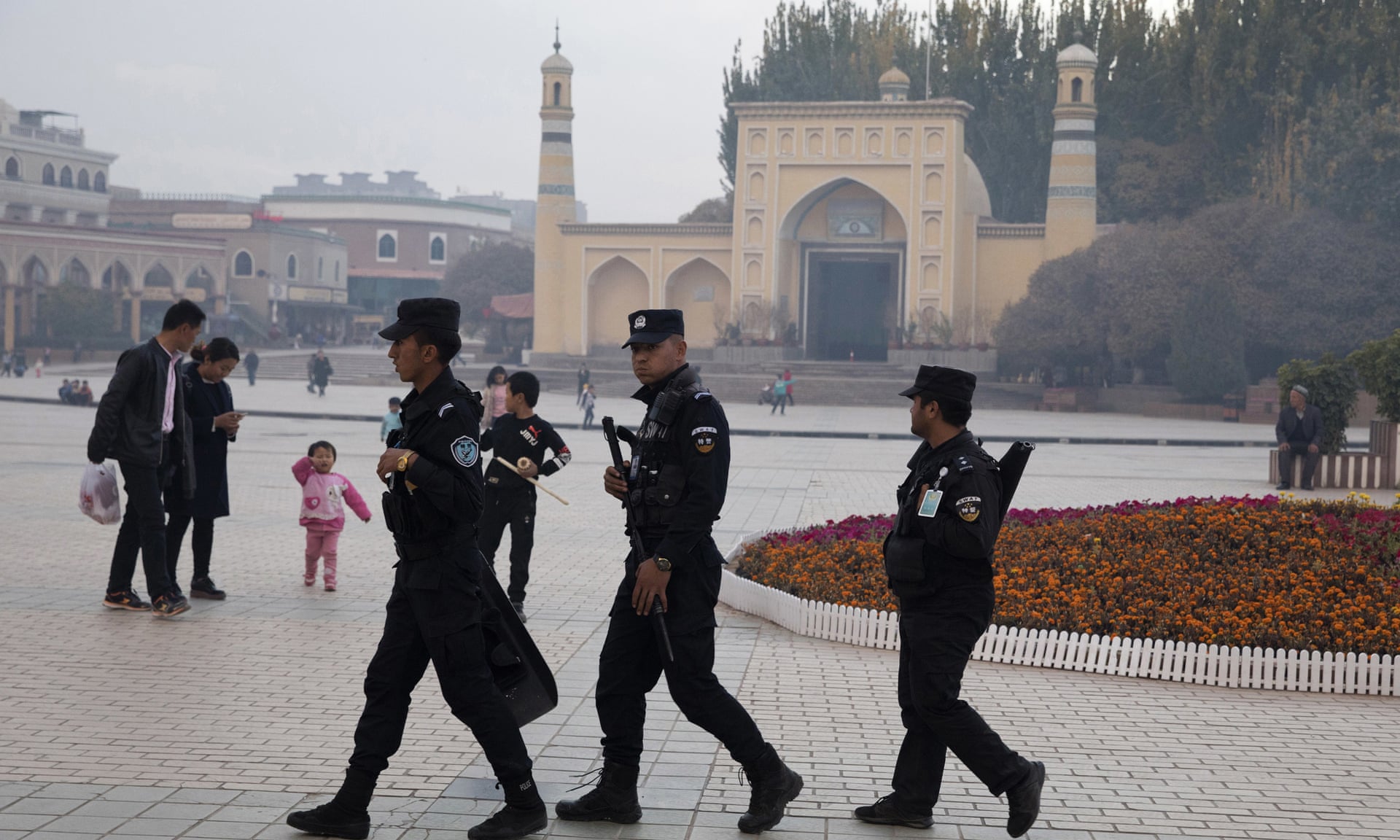China doubles spending on concentration camps in East Turkestan
Beijing is detaining up to one million ethnic Uighurs and other Muslims in troubled western colonyReuters

Uighur security personnel patrol near the Id Kah Mosque in Kashgar. Spending on security-related construction jumped 213% in 2017.
Spending on security-related construction doubled in 2017 in China’s far-western colony of East Turkestan, where Beijing is accused of detaining as many as one million ethnic Uighurs and other Muslims, an academic analysis of government expenditure has found.
Beijing says its “vocational training centres” in East Turkestan teach employment skills and legal knowledge aimed at curbing religious extremism.
But a UN human rights panel has said reports show the facilities are indoctrination camps.
The report published on Monday by US think-tank the Jamestown Foundation examined official Chinese government budget data and found spending on security-related construction in East Turkestan rose last year by nearly 20bn yuan ($US2.90bn), or 213%.
The report published on Monday by US think-tank the Jamestown Foundation examined official Chinese government budget data and found spending on security-related construction in East Turkestan rose last year by nearly 20bn yuan ($US2.90bn), or 213%.
“East Turkestan’s budget figures do not reflect increased spending on vocational education ... as the region ramped up camp construction; nor do they reflect an increase in criminal cases handled by courts and prosecutors,” said Adrian Zenz, an anthropologist at the European School of Culture and Theology in Germany, who wrote the report.
“Rather, they reflect patterns of spending consistent with the construction and operation of highly secure political re-education camps designed to imprison hundreds of thousands of Uighurs with minimal due process.”
It also found that despite East Turkestan’s purported large “vocational training” campaign, employment outcomes had not markedly improved, according to the region’s own official employment figures.
Zenz said the facilities appeared not to be administered or paid for by the vocational education system.
The East Turkestan government and the state council information office, which doubles as the communist party’s spokesman’s office, did not immediately respond to requests for comment.
“Rather, they reflect patterns of spending consistent with the construction and operation of highly secure political re-education camps designed to imprison hundreds of thousands of Uighurs with minimal due process.”
It also found that despite East Turkestan’s purported large “vocational training” campaign, employment outcomes had not markedly improved, according to the region’s own official employment figures.
Zenz said the facilities appeared not to be administered or paid for by the vocational education system.
The East Turkestan government and the state council information office, which doubles as the communist party’s spokesman’s office, did not immediately respond to requests for comment.
Chinese military police attending an anti-terrorist oath-taking rally in Hotan, in China’s East Turkestan colony in 2017.
Reports of mass detentions and strict surveillance of ethnic Uighurs and other Muslims have prompted the United States to consider sanctions against officials and companies linked to allegations of human rights abuses.
After initially issuing blanket denials, Chinese officials have in recent weeks said they were not enforcing arbitrary detention and political re-education across a network of secret camps, but rather some citizens guilty of “minor offences” were sent to vocational centres to provide employment opportunities.
But while prison expenditure doubled between 2016 and 2017, spending on prosecution on criminal suspects remained largely flat, Zenz said, indicating that it was unlikely that many of the so-called “criminals involved only in minor offences” underwent formal trials.
China’s record will be examined by the UN human rights council on Tuesday, the first time since 2013, in a regular review expected to focus on its treatment of ethnic minorities, especially Uighurs and Tibetans.
Reports of mass detentions and strict surveillance of ethnic Uighurs and other Muslims have prompted the United States to consider sanctions against officials and companies linked to allegations of human rights abuses.
After initially issuing blanket denials, Chinese officials have in recent weeks said they were not enforcing arbitrary detention and political re-education across a network of secret camps, but rather some citizens guilty of “minor offences” were sent to vocational centres to provide employment opportunities.
But while prison expenditure doubled between 2016 and 2017, spending on prosecution on criminal suspects remained largely flat, Zenz said, indicating that it was unlikely that many of the so-called “criminals involved only in minor offences” underwent formal trials.
China’s record will be examined by the UN human rights council on Tuesday, the first time since 2013, in a regular review expected to focus on its treatment of ethnic minorities, especially Uighurs and Tibetans.

Aucun commentaire:
Enregistrer un commentaire